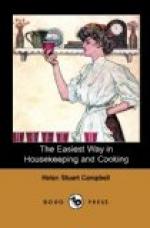What is this air, seemingly so hard to secure, so hard to hold as part of our daily life, without which we can not live, and which we yet contentedly poison nine times out of ten?
Oxygen, nitrogen, carbonic acid, and watery vapor; the last two being a small portion of the bulk, oxygen and nitrogen making up four-fifths. Small as the proportion of oxygen seems, an increase of but one-fifth more would be destruction. It is the life-giver, but undiluted would be the life-destroyer; and the three-fifths of nitrogen act as its diluent. No other element possesses the same power. Fires and light-giving combustion could not exist an instant without oxygen. Its office seems that of universal destruction. By its action decay begins in meat or vegetables and fruits; and it is for this reason, that, to preserve them, all oxygen must be driven out by bringing them to the boiling point, and sealing them up in jars to which no air can find entrance. With only undiluted oxygen to breathe, the tissues would dry and shrivel, fuel burn with a fury none could withstand, and every operation of nature be conducted with such energy as soon to exhaust and destroy all power. But “a mixture of the fiery oxygen and inert nitrogen gives us the golden mean. The oxygen now quietly burns the fuel in our stoves, and keeps us warm; combines with the oil in our lamps, and gives us light; corrodes our bodies, and gives us strength; cleanses the air, and keeps it fresh and invigorating; sweetens foul water, and makes it wholesome; works all around us and within us a constant miracle, yet with such delicacy and quietness, we never perceive or think of it, until we see it with the eye of science.”
Food and air are the two means by which bodies live. In the full-grown man, whose weight will average about one hundred and fifty-four pounds, one hundred and eleven pounds is oxygen drawn from the air we breathe. Only when food has been dissolved in the stomach, absorbed at last into the blood, and by means of circulation brought into contact with the oxygen of the air taken into our lungs, can it begin to really feed and nourish the body; so that the lungs may, after all, be regarded as the true stomach, the other being not much more than the food-receptacle.
Take these lungs, made up within of branching tubes, these in turn formed by myriads of air-cells, and each air-cell owning its network of minute cells called capillaries. To every air-cell is given a blood-vessel bringing blood from the heart, which finds its way through every capillary till it reaches another blood-vessel that carries it back to the heart. It leaves the heart charged with carbonic acid and watery vapor. It returns, if pure air has met it in the lung, with all corruption destroyed, a dancing particle of life. But to be life, and not slow death, thirty-three hogsheads of air must pass daily into the lungs, and twenty-eight pounds of blood journey from heart to lungs and back again three times in each hour. It rests wholly with ourselves, whether this wonderful tide, ebbing and flowing with every breath, shall exchange its poisonous and clogging carbonic acid and watery vapor for life-giving oxygen, or retain it to weigh down and debilitate every nerve in the body.




